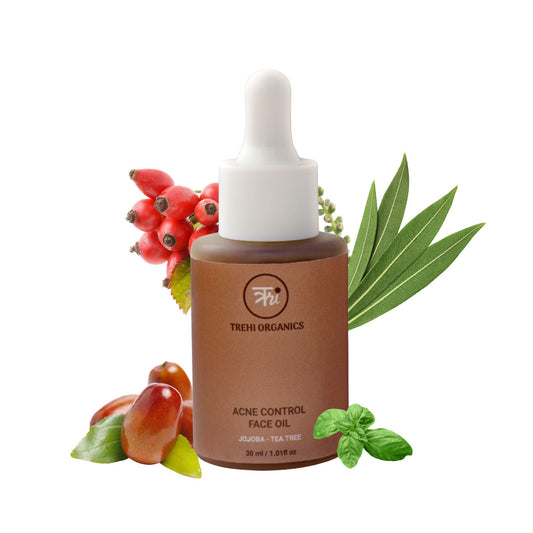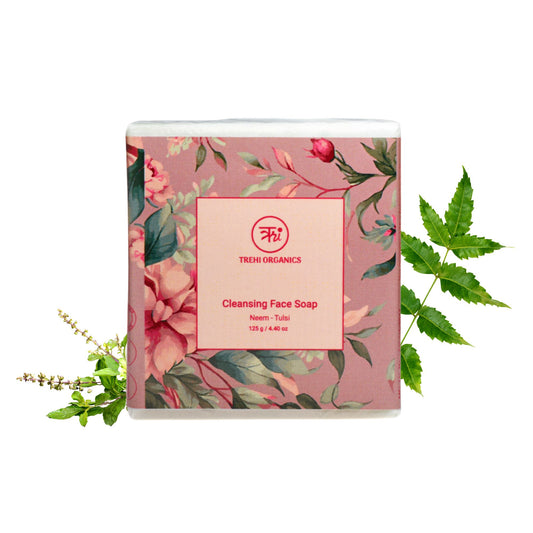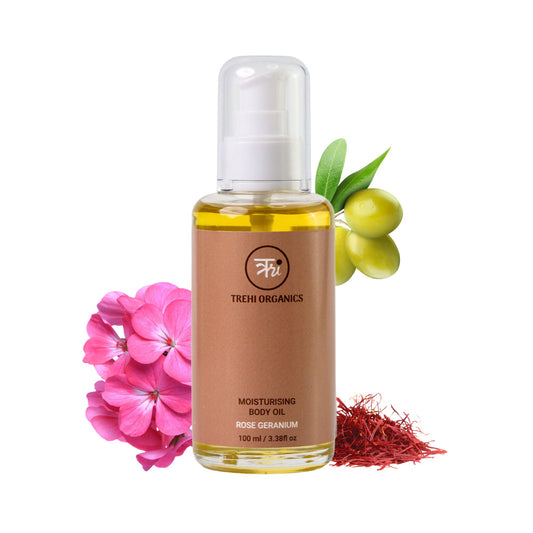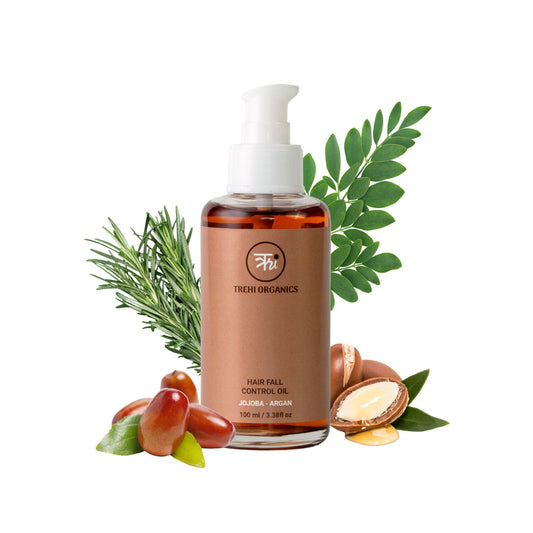Do you ever notice a lot of hair falling out when you comb your hair? It can be frustrating to see hair everywhere except on your head! Hair fall is a common problem that many people face, and it can lead to worries about how to take care of our hair.
We often try expensive shampoos, conditioners, and serums to stop hair fall. But do they work? And are they safe for our health? In this article, we'll talk about ways to control hair fall and some natural hair fall remedies to make your hair stronger.
Understanding Hairfall
Many of us worry when we see hair strands on our pillows, in the shower drain, or stuck in our combs. But did you know that losing some hair every day is completely normal? It's a natural part of the hair growth cycle.
On average, it's considered normal to lose between 50 to 100 hair strands per day. These hairs fall out as part of the natural shedding process and are replaced by new hair growth. However, if you notice that you're losing more than this amount, it could be a sign of excessive hair fall.
Causes Of Hair Fall
Several factors can contribute to hair fall, including:
-
Genetics: Family history plays a significant role in determining whether you are prone to hair loss.
- Hormonal changes: Hormonal imbalances, such as those that occur during puberty, pregnancy, or menopause, can lead to temporary hair loss.
- Stress: High levels of stress can disrupt the hair growth cycle and lead to increased shedding.
- Nutritional deficiencies: A lack of essential vitamins and minerals, such as iron, zinc, and vitamin D, can weaken the hair and contribute to hair fall.
- Hairstyling habits: Excessive use of heat styling tools, tight hairstyles, and harsh chemicals can damage the hair and cause it to break or fall out.
The Culprit Chemicals
Repeated exposure to harsh chemicals in hair products can weaken the hair shaft, leading to increased shedding and thinning over time. Additionally, the scalp's health can be compromised, leading to conditions such as dandruff and itching, which can further contribute to hair fall.
Here are some chemicals in most common hair products that are quite concerning.
|
Health Concerns |
Chemicals |
|
Cancer-Causing |
Formaldehyde |
|
Endocrine Disruptors |
Coco-Betaine |
|
Neurotoxins |
Limonene, Serine, Dipropylene Glycol, Methylchloroisothiazolinone, Methylisothiazolinone |
|
Reproductive and Developmental Toxicity |
Linalool, Limonene, Coco-Betaine, Dimethicone, Benzyl Salicylate, Cetrimonium Chloride, Laureth Sulfate, Dipalmitoylethylhylmonium Methosulphate, 1,3- Octadecanediol, Carbomer, Methyl Cocoate, Trideceth-6 |
| Allergies & Immunotoxicity |
Fragrance (Parfum), SLS, SLES , Benzyl Salicylate, Benzyl Alcohol, Linalool, Hexyl Cinnamal, Methylchloroisothiazolinone, Methylisothiazolinone |
|
Sensitizer |
Behentrimonium Chloride, PEG-7 Propylheptyl Ether, Cetrimonium Chloride, Phenoxyethanol |
Note- We have compiled a list of some of the most common chemicals found in Haircare products. However, it's crucial to note that this list is not exhaustive. When assessing other products, you can utilize the Environmental Working Group (EWG) website to investigate the potential concerns associated with additional ingredients. This empowers you to make informed choices about the haircare products you use.
Embracing Natural Hair Care for Hairfall Prevention
Hair fall can't be resolved with a one-size-fits-all approach; it requires a multifaceted solution embedded in a holistic lifestyle. In this blog post, we'll explore both topical and internal approaches to tackle hair fall effectively.
Choosing the Right Shampoo:
Traditional shampoos loaded with chemicals often leave the scalp dry and irritated, leading to more hair fall. Opting for a gentle shampoo that cleanses without compromising scalp health is essential. To address this, we can check out homemade shampoo recipes tailored for different types of hair.
Natural Oils for Strengthening Hair:
Oiling is a time-honored practice that can significantly contribute to strengthening hair cuticles and reducing hair fall. Natural oils are rich in nutrients and properties that nourish the scalp, promote hair growth, and prevent breakage. Let's explore the benefits of various oils in detail:
Jojoba Oil:
- Jojoba oil is renowned for its ability to treat acne, psoriasis, and other skin conditions.
- When applied to the scalp, it moisturizes and conditions the hair, preventing dryness and breakage of fragile hair.
- Its antioxidant properties protect the hair from free radical damage and promote overall scalp health.
Argan Oil:
- Argan oil is a versatile oil that moisturizes and conditions the hair, preventing damage from styling tools and chemical treatments.
- It strengthens the hair follicles, reducing breakage and promoting healthier hair growth.
- Additionally, argan oil protects the hair from sun damage, making it an ideal choice for maintaining hair health.
Onion Oil:
- Onion oil is a powerhouse ingredient for combating hair fall and promoting hair growth.
- Rich in essential nutrients, onion oil nourishes the scalp, improves blood circulation, and strengthens hair follicles.
- It contains sulfur, which helps reduce breakage and thinning, resulting in thicker, healthier hair.
Hibiscus Oil:
- Hibiscus oil is known for its ability to strengthen hair and promote shine.
- It contains vitamins and nutrients that nourish the scalp and hair follicles, reducing dandruff and hair loss.
- Regular use of hibiscus oil can result in stronger, more vibrant hair with improved overall health.
Curry Leaf Oil:
-
Curry leaf oil is a natural remedy for hair fall and thinning hair.
- It contains properties that stimulate hair growth, reduce hair loss, and improve hair texture.
- Additionally, curry leaf oil nourishes the scalp, preventing dryness and flakiness, and promotes healthier, stronger hair.
Nettle Oil:
- Nettle oil is renowned for its ability to prevent hair loss and strengthen hair strands, acting as a natural tonic for the scalp.
- Additionally, nettle oil boasts natural antifungal and anti-inflammatory properties, making it effective in controlling dandruff and improving the overall texture of your hair.
Incorporating Oils for Hair Loss Prevention
Incorporating oils into your hair care routine is simple and can be done in various ways to maximize their benefits. Here are some tips on how to effectively use these natural oils:
- Pre-wash Treatment: Apply the oil of your choice to your scalp and hair a few hours before you wash your hair. Massage it gently into the scalp to improve circulation and ensure even distribution. This allows the oil to deeply penetrate the hair follicles and nourish the roots.
- Mix and Match: Experiment with mixing two or more oils to create a customized blend that addresses your specific hair concerns. For example, combine jojoba oil with argan oil for added hydration and shine, or mix onion oil with hibiscus oil to promote hair growth and strength.
- Warm Up the Oil: Before applying the oil, warm it slightly by placing the container in a bowl of warm water or heating it gently. Warm oil is more easily absorbed by the hair and scalp, allowing for better penetration of nutrients.
- Massage Properly: Take your time to massage the oil into your scalp using your fingertips in gentle circular motions. This not only helps to distribute the oil evenly but also stimulates blood flow to the scalp, promoting hair growth and overall scalp health.
-
Leave-In Treatment: For deeper conditioning, you can leave the oil in your hair overnight and wash it out in the morning. Simply cover your hair with a shower cap or towel to prevent the oil from transferring onto your pillowcase.
Maintaining a Healthy Diet:
They say we are what we eat, hence every problem we face is related to our diet somehow. A balanced diet plays a crucial role in promoting healthy hair growth and preventing hair fall. Make sure to include plenty of nutrient-rich foods in your meals, such as fruits, vegetables, lean proteins, and whole grains. Foods rich in vitamins A, C, E, and Biotin, as well as minerals like iron, zinc, and selenium, are particularly beneficial for hair health. You can also check out these foods for strong and healthy hair!
Exercise Regularly:
Regular physical activity is not only beneficial for your overall health but also counts as a healthy hair remedy. Exercise improves blood circulation, which helps deliver essential nutrients to the scalp and promotes hair growth. Aim for at least 30 minutes of moderate-intensity exercise most days of the week. You can choose from a variety of activities such as walking, jogging, cycling, swimming, or yoga.
Stress Reduction Through Meditation:
Chronic stress can make your hair health worse by disrupting the hair growth cycle and leading to increased shedding. Practicing stress-reduction techniques like meditation, deep breathing exercises, yoga, or mindfulness can help lower stress levels and promote a sense of calm and relaxation. Find activities that help you unwind and make time for them regularly to support your hair and overall well-being.
Prioritize Proper Sleep:
Getting an adequate amount of quality sleep is essential for healthy hair growth and overall health. Aim for 7-9 hours of uninterrupted sleep each night to allow your body to repair and regenerate cells, including hair follicles. Create a relaxing bedtime routine, avoid caffeine and electronic devices before bedtime, and create a comfortable sleep environment to ensure restful sleep.
Conclusion
In conclusion, achieving healthy hair isn't about expensive products or quick fixes. It's about understanding the root causes of hair fall and embracing holistic solutions as hair fall remedies. By adopting gentle products and incorporating healthy habits into your routine, you can transform your hair care regimen and achieve stronger, more vibrant hair. Let's prioritize self-care and nourish our bodies from the inside out. Together, let's embark on a journey to healthier, happier hair. Start today and take the first step towards a more radiant you!
FAQs
Q. How can I make my hair stronger and stop hair fall?
Ans. Strengthen your hair and reduce hair fall by using gentle, natural products, incorporating healthy habits, and addressing underlying causes like genetics, hormonal changes, stress, and nutritional deficiencies.
Q. How to make hair stronger?
Ans. To make hair stronger, focus on scalp health, incorporate natural oils into your hair care routine, maintain a balanced diet rich in essential nutrients, exercise regularly, manage stress levels, and prioritize proper sleep.
Q. What is the best natural remedy for hair fall?
Ans. One of the best natural remedies for hair fall is using onion oil, which is rich in essential nutrients that nourish the scalp, improve blood circulation, and strengthen hair follicles. Regular use can help reduce breakage and thinning, resulting in thicker, healthier hair.
